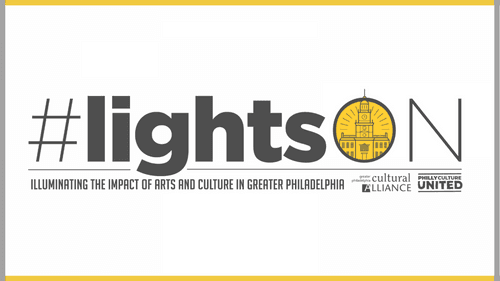Stay in the Loop
BSR publishes on a weekly schedule, with an email newsletter every Wednesday and Thursday morning. There’s no paywall, and subscribing is always free.
Budgets ask how; the arts ask why
#LightsOn tells Philly leaders that our arts scene won’t survive without economic relief

In May, when Mayor Kenney first attempted to remedy less than one percent of the city’s 2020 budget shortfall by draining our Cultural Fund to zero (among other cuts), our community rallied with a protest that ultimately saved a portion of the fund, which is a critical engine for hundreds of local organizations. But with another COVID shutdown under way, crisis looms again.
This pandemic will end, maybe in a matter of months, if new vaccines prevail. If we axe funding for arts and culture in the meantime, “we might have a guide for how some version of this World Heritage City will emerge,” BSR wrote last spring. “But we aren’t cogs in a city machine. We’re human beings with a million bridges to build—through theater and film and music, stories and books, poems and paintings and processions. It’s not just how we’re fighting to overcome this pandemic. It’s why.”
Staying home, again
Now that a second wave of COVID closures is upon us, shuttering museums and other cultural venues that poured their already-distressed budgets into safety measures for a tentative reopening that gave the virus just enough time to double down, arts and culture organizations (among other hard-hit sectors) feel a renewed terror.
That’s the subject of the #LightsOn campaign, launched last week by the Philadelphia Cultural Alliance and Philly Culture United.
Bereft of support from city leaders, “we are left to brace for a winter of mandated darkness, without a single word or discussion of immediate economic relief for arts and culture,” wrote Cultural Alliance interim president and CEO, Priscilla M. Luce, in an email to member organizations, including BSR. #LightsOn urges us to illuminate our leaders on the need to include the arts sector in economic relief plans.
Devastating losses
The campaign continued in an Inquirer op-ed by Luce and Philly Culture United leader Aalyah Duncan, who argue that arts and culture are an “imperative infrastructure within Philadelphia” that mirrors essential utilities like water, electricity, and transit.
“Philadelphia isn’t prepared for the loss of the arts and culture infrastructure we are about to suffer,” they conclude. “Without real, immediate economic relief at the local, state, and federal level, these devastating losses will come,” and even if it does reopen, our city will never be the same.
Philly’s very heart is at stake here (and might even save America). Our cultural sector (including museums, performances, and tourism) pumps billions into the local economy each year. It’s old news that dollars invested in the arts have an extraordinary ROI.

A bigger lens
But we still end up on the chopping block year after year, never quite able to win the argument that the arts are an excellent economic investment and a practical infrastructure as vital as roads and power lines.
Because budgets and infrastructure are how we live. But the arts are why we live, exploring and loving and learning and feeling and connecting, not merely surviving. And there isn’t a spreadsheet or budget in the world that can quantify that why.
We need a bigger lens, and the last several months in Philadelphia have provided it, both because of the way our artists helped sustain us through excruciating times, and because of what happened when we took to the streets this summer in support of racial justice.
What makes us human
Is it surprising that the same leaders who would turn their backs on the why of our lives—i.e., strangle the arts when we need them most—also forget or ignore our humanity in other ways, like gassing peaceful protestors?
The collapse of the arts sector, while dire, is not an evil on the scale of police brutality. And of course, City Councilmembers grappling with whether or not they’ll let the arts survive in Philly are not the same people as the law-enforcement officers who assaulted our residents, but there is an eerie parallel in the officers’ and the politicians’ mindset: leadership without regard for what makes us human.
Government leaders who are serious about justice and serious about reasons to survive this pandemic would be foolish to forget or ignore arts and culture if and when a relief bill hits their desk.
The why we keep
Unfortunately, many hows of surviving the pandemic—like closing libraries, museums, and performance venues because we can’t get within six feet of each other—are depriving us of the experiences and connections that are some of the biggest whys of human existence. But as long as we support the survival of the arts and demand that our leaders do the same, that’s a why we’ll never have to give up (especially as arts organizations keep producing a stunning array of distanced and digital programming), even though we need to stay home for a while longer.
You can send a letter about support for the arts to our City Councilmembers here. Boost the message online with the #LightsOn hashtag.
Image description: A daytime large-scale photo from the inside of a roofed outdoor amphitheater with hundreds of seats, all of them empty. The tiny figures of orchestra musicians are spread across the stage.
Image description: A yellow-and-black logo for the #LightsOn campaign reads “Lights On,” with a drawing of Philadelphia’s Independence Hall in the “O.” Under that, a tagline reads, “Illuminating the impact of arts and culture in Greater Philadelphia.”
Sign up for our newsletter
All of the week's new articles, all in one place. Sign up for the free weekly BSR newsletters, and don't miss a conversation.

 Alaina Johns
Alaina Johns